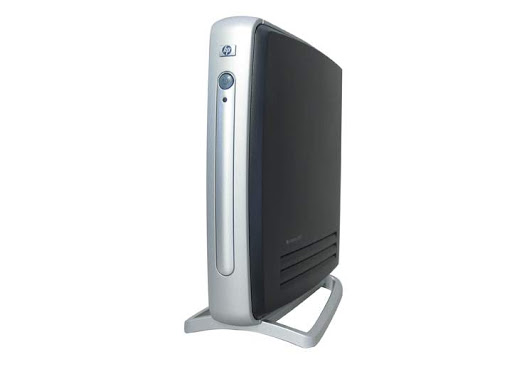HP Compaq T5000 - Home Seedbox

I want to introduce one old but amusing device to the HV, the thin client of the HP Compaq T5000.
Under the cat description, photos and installation of rtorrent + rutorrent on it.
The HP Compaq t5000 is a thin client, in my case released in the 2003rd year. Thin client stuffing:
| processor | Transmeta (tm) Crusoe (tm) Processor TM5800 - 1000 MHz |
| memory | 128KiB L1 cache |
| memory | 512KiB L2 cache |
| memory | 256MiB SODIMM DDR |
| bridge | VT8231 [PCI-to-ISA Bridge] |
| bridge | VT8235 ACPI |
| storage | VT82C586A / B / VT82C686 / A / B / VT823x / A / C PIPC Bus Master IDE |
| disk | 256MB 256MB ATA Flash |
| bus | VT82xxxxx UHCI USB 1.1 Controller |
| multimedia | VT82C686 AC97 Audio Controller |
| network | VT6102 [Rhine-II] |
In my case, on a thin client, Windows XP embedded was installed on one and Windows CE .NET on another. What operating system is installed depends only on the size of the RAM and the IDE DOM module.
')
The first thing that came to mind was to enable RDP (remote control), install uTorrent, connect a USB hard drive and use all of this as a torrent. Fortunately, the thin client consumes within 20W.
After thinking a bit, I decided to install Ubuntu. because The CD drive was not at hand, but the tftp server was raised, it was decided to install Ubuntu over the network. And since the built-in IDE DOM with a size of 256MB is clearly not enough, the system was installed on a 4 gigabyte USB flash drive. The installation option that suits me is described here.
simplified, I just took the ubuntu-installer folder from netboot.tar.gz , put it in / tftpboot / and in /tftpboot/pxelinux.cfg/01-00-0bcd-6d-8e-58 added:
include ubuntu-installer/i386/boot-screens/menu.cfg
default ubuntu-installer/i386/boot-screens/vesamenu.c32
prompt 0
timeout 0
01-00-0b-cd-6d-8e-58 is the mac address of the thin client.
Next, install rtorrent + rutorrent.
apt-get install rtorrent wget libapache2-mod-scgi apache2 php5 php5-mysql php5-curl screen
wget rutorrent.googlecode.com/files/rtorrent-2.8.tar.gz
tar zxf rtorrent-2.8.tar.gz
mv rtorrent /var/www/
echo 'SCGIMount /RPC2 127.0.0.1:5000' >> /etc/apache2/apache2.conf
ln -s /etc/apache2/mods-available/scgi.load /etc/apache2/mods-enabled/
service apache2 restart
useradd torrent -d /torrents/
echo 'scgi_port = localhost:5000' > /torrents/.rtorrent.rc
echo 'port_range = 6925-6925' >> /torrents/.rtorrent.rc
echo 'schedule = watch_directory,5,5,load_start=/torrents/watch/*.torrent' >> /torrents/.rtorrent.rc
echo 'directory = /torrents/download/' >> /torrents/.rtorrent.rc
echo 'session = /torrents/session/' >> /torrents/.rtorrent.rc
echo 'hash_read_ahead = 32' >> /torrents/.rtorrent.rc
echo 'hash_max_tries = 1' >> /torrents/.rtorrent.rc
echo 'hash_interval = 1' >> /torrents/.rtorrent.rc
mkdir -p /torrents/{download,session,watch}
chown -R torrent:torrent /torrents/
wget libtorrent.rakshasa.no/attachment/wiki/RTorrentCommonTasks/rtorrentInit.sh?format=raw -O /etc/init.d/rtorrent
sed -i 's/user="user"/user="torrent"/' /etc/init.d/rtorrent
chmod +x /etc/init.d/rtorrent
update-rc.d rtorrent defaults
/etc/init.d/rtorrent start
We now turn to the gland (the pictures are clickable).
 |  |  |  |  |  |
 |  |  |  |  |  |
If you spit on aesthetics, you can remove the cover and plug in the SATA controller, to which you plug in conventional hard drives.
Source: https://habr.com/ru/post/80803/
All Articles